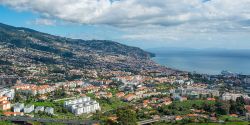Funchal (Portuguese pronunciation: [fuˈʃal] (listen)) is the largest city, the municipal seat and the capital of Portugal's Autonomous Region of Madeira, bordered by the Atlantic Ocean. The city has a population of 111,892, making it the sixth largest city in Portugal, and has been the capital of Madeira for more than five centuries. Because of its high cultural and historical value, Funchal is one of Portugal's main tourist attractions. It is also popular as a destination for New Year's Eve, and it is the leading Portuguese port on cruise liner dockings.
History
This settlement began around 1424, when the island was divided into two captaincies. The zones that would become the urbanized core of Funchal were founded by Joao Goncalves Zarco who settled there with members of his family. Owing to its geographic location, the site became an important maritime port and its productive soils attracted new settlers. Its coastal position, the most productive on the island, quickly permitted Funchal to develop an urban core and surpass the populations of other settlements.
In the early 15th century, Alvaro Fernandes became the commander of Funchal.
As part of its administrative role, the settlement received its primary lighthouse between 1452 and 1454, when it was elevated to the status of vila and municipal seat. Funchal became an important transfer point for European commercial interests. Christopher Columbus was one of the early settlers, but later many of the merchant families established commercial interests on the island, including: Joao d'Esmenaut from the Picardy region, the Lomelino from Genoa, the Mondragao from Biscay, the Acciauoli from Florence, the Bettencourts from France, the Lemilhana Berenguer from Valencia and many others.
During the second half of the 15th century, the sugar industry expanded significantly along the southern coast, from Machico until Faja da Ovelha, making Funchal the most important industrial centre of the industry. By the end of the c
